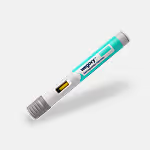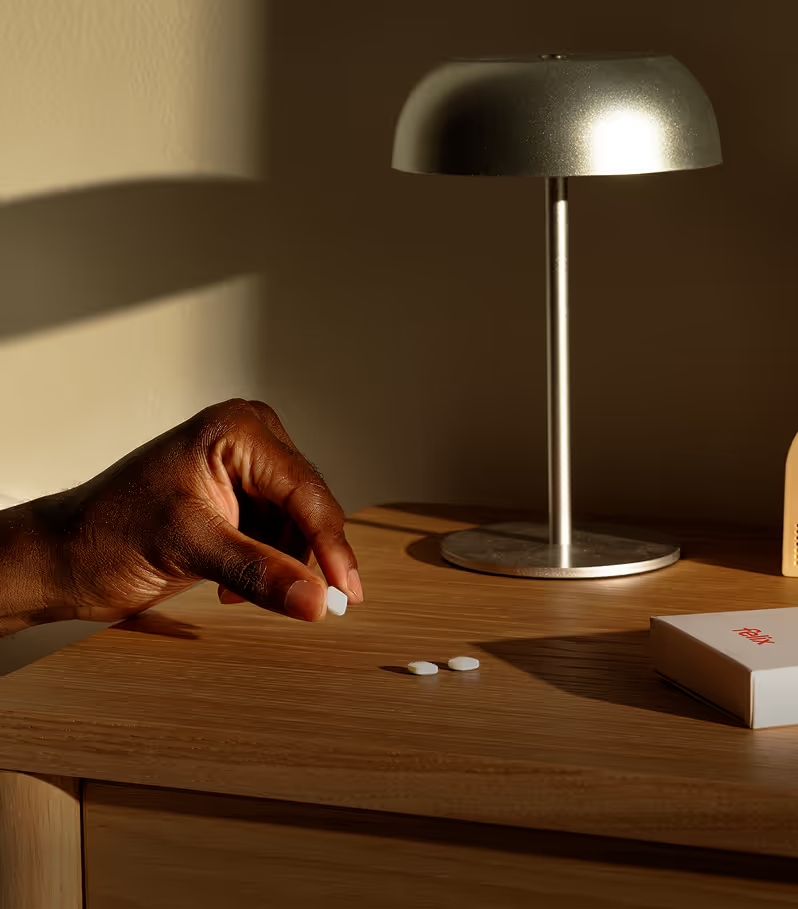Download the Felix App
Earn reward, visit our shop and get exclusive offers on the app
Download nowEarn reward, visit our shop and get exclusive offers on the app
Download nowPut your health first in 2026 with free visits on all categories, and $200 off longevity testing.
Download nowPut your health first in 2026 with free visits on all categories, and $200 off longevity testing.
Download now
AI-generated summaries may be inaccurate and do not constitute medical advice. Third-party AI tools are not under Felix's control, and your use of them is at your own risk.
For those that are interested in starting birth control, or those who are looking to switch their existing birth control method for something different, it can be difficult knowing which method is going to work best for you.
“How does birth control work?” is one of the most common questions we get asked by our patients. This page will help you better understand what birth control pills are, as well as when birth control pills start working, so you can make an educated decision and choose what may be best for you based on your unique needs.
If you’re interested in talking to a healthcare practitioner about which type of birth control pill is a good option for you, based on your health, medical history, and personal preferences, complete an assessment to get started today.
IMPORTANT TO NOTE: We should note that this blog is not meant to be taken as medical advice. There is some information regarding basic pill use and effectiveness, but for information relating to your specific birth control needs, you should always consult with your healthcare practitioner directly, before making any changes or decisions regarding your birth control.
‘The Pill’ is probably the most well-known type of hormonal birth control. It can contain both estrogen and progestin, or just progestin, depending on the type of birth control pill.
The pill’s (estrogen and progestin) effectiveness depends on it being taken daily. It works by preventing ovulation, as well as thickening cervical mucus, in order to block sperm from entering the uterus.
In addition to these effects, birth control pills can also regulate your menstrual cycles and reduce symptoms such as heavy and painful periods.
These are pills that control both the estrogen and progestin hormones. There are two types of these combination birth control pills:
Every pill in the pack will contain the same amount of hormones. This means that your dosage remains consistent throughout your birth control cycles.
In this type of birth control pill, the hormone levels in the pills change throughout your menstrual cycle, which mimics your body’s natural hormonal fluctuations.
Multiphasic types of birth control pills come in biphasic (two phases) and triphasic (three phases) varieties, depending on your needs.
Also known as ‘mini pills’, these types of birth control pills only contain progesterone. They have no estrogen.
These types of birth control pills are only suitable for individuals who can’t take estrogen-containing contraceptives, because of health reasons (i.e., breastfeeding, history of blood clots, migraine with aura, etc.).
Progestin-only birth control pills are usually taken continuously, without a break in the dosing cycle. However, there is a new medication (Slynd), which does take a break from the cycle once per month, for 4 days at a time.
These types of birth control pills are meant to reduce the frequency of your menstrual periods. They do this by extending the time between your periods to once every 3 months.
Extended cycle birth control pills usually contain a combination of hormones. They’re taken continuously for an extended period of time (i.e., 3 months), before taking a break to allow for withdrawal bleeding.
Continuous cycle pills are taken without any break. This leads to minimal or no menstrual bleeding at all.
There are some types of birth control pills that contain lower doses of hormones than traditional birth control formulas.
These are a great alternative for people that are sensitive to the hormonal side effects of traditional birth control pills.
Sometimes called ‘the morning after pill’, these pills are intended for emergency use only, after unprotected sex when taken within 5 days. ECPs can prevent pregnancy, but they’re not intended to replace regular contraception or birth control methods.
Many of the brand-name birth control pills have generic equivalents available for purchase.
These generic versions contain the same active ingredients, but they’re often less expensive.
If you’d like to talk to a healthcare practitioner about which type of birth control pills make the most sense for you, complete a short online assessment to get started with Felix today!
So, now that you understand some basics, how does birth control work?
As we mentioned, the pill's effectiveness depends on it being taken daily. Missing pills or taking them irregularly can reduce the efficacy of your medication, which impacts its ability to prevent pregnancy. Missing too many pills between cycles does impact when birth control pills start working, so it’s important to always bear this in mind.
When taken accurately, there are a few ways that birth control pills prevent pregnancy:
Taking the combined (estrogen and progestin) birth control pills stops ovulation, which is the primary way it prevents pregnancy. Progestin only pills partially stop ovulation by thinning the lining of the uterus.
Specifically, most birth control pills contain synthetic versions of estrogen and/or progestin. These hormones work together to inhibit the pituitary gland in your brain from releasing the hormones that stimulate ovulation.
When your body doesn’t receive the hormonal trigger to begin ovulation, your ovaries don’t release an egg. In turn, this prevents fertilization/pregnancy from occurring.
The hormones in birth control pills cause changes in your cervical mucus (the fluid produced by the cervix). The changes make the mucus more viscous, which creates a barrier that’s difficult for sperm to penetrate and prevents them from reaching eggs to fertilize them.
Combined with preventing ovulation (the release of eggs), this significantly reduces the likelihood of sperm reaching an egg and achieving fertilization/pregnancy.
Birth control pills may additionally affect your uterine lining, making it less receptive to the implantation of an egg that has been successfully fertilized.
While this is a less common mechanism, and isn’t the primary way that birth control pills prevent pregnancy, this feature does contribute to their overall effectiveness.
SIDE NOTE: It’s important to note that certain other medications or medical conditions may interfere with the effectiveness of your birth control pills.
It’s extremely important that you discuss any of these potential interactions or concerns with your healthcare practitioner, before requesting birth control pills. If you’d like to talk to a practitioner about birth control options today, just complete a short assessment to get started.
If you’ve been wondering “when does birth control pills start working?” This section will help.
The efficacy of your birth control pill will depend on when you start taking them in relation to your normal menstrual cycle, as well as ensuring you take the pill as instructed.
Here’s 3 things that you should keep in mind regarding when and how your birth control starts working:
Taking a combination pill (containing estrogen and progesterone) on the first day of your menstrual period (Day 1 start), means that you're more protected from pregnancy immediately.
However, although birth control does stop ovulation, if you’re taking a combination birth control pill on any other day of your menstrual cycle, it can take up to 7 days for the birth control to effectively prevent pregnancy.
During these 7 days, be sure to use backup contraception (i.e., barrier methods like condoms), to reduce the chances of pregnancy occurring.
If you’re using mini-pills (progestin-only), and you start taking them during any day of your menstrual cycle, be sure to use backup contraception for the first 48 hours, in order to reduce the chances of becoming pregnant.
As we’ve mentioned, the pill’s effectiveness depends heavily on it being taken consistently.r.
This is important to remember, regardless of when you start taking the pill. Missing pills or taking them irregularly can reduce your birth control’s effectiveness.
If you’re concerned at all about the timing of your birth control pills, and when they’ll become full effective (or if you’ve missed pills), it’s always a good idea to consider using backup contraception.
This could involve male or female condoms, or other barrier methods, which can provide you with extra protection, until you’re confident that your birth control has become fully effective.
If you’re finding it difficult to maintain the daily pill regimen at the same time each day, it may be a good idea to consider an alternative method of birth control (i.e., the patch or ring), which requires less frequent dosing.
Birth control pills are meant to be taken orally, once a day, at the same time each day.
To help ensure that you’re your birth control pill does stop ovulation (and pregnancy), there are a few things that you can do to make your own life easier, such as:
You should try to pick a time of day to take your pill, when you believe you can consistently remember to take the pill each day. Some prefer the morning with breakfast, while others prefer before bed.
This is a personal decision based on your own schedule and preference. There’s no right or wrong answer, it’s important to find a time that’s best for you.
If you’re starting a new pack, always begin with the first pill in the pack. For 21/28-day packs, the first 21 days are ‘active’ pills.
Depending on whether it’s a 21-day pack or 28-day pack, you’ll either have 7 days of no pills or 7 days of ‘placebo pills’, at the end of your cycle; which you can either skip or take to maintain your routine.
For the pill to be effective, it needs to be taken at the same time every day.
Depending on your goals of taking the pill, ensuring you’re taking it consistently will help with its effectiveness and reduce the chances of side effects like spotting.
Pay attention to the instructions provided with your specific type of birth control pills. They could have details you need to follow (i.e., whether to start on Day 1 or a Sunday start).
Talk to your practitioner about whether you should be using backup contraception for protection when you’re starting a new birth control pill or changing to an alternative type of birth control.
After you finish a pack of pills, immediately start the next pack without taking a break; even if your period isn’t over yet. This helps maintain continuous hormone levels, while preventing gaps in your contraceptive coverage.
We know we’ve said this before, but it’s so important, we’ll say it again.
Make a habit of taking your pill at the same time each day. This will minimize the risk of you missing doses, side effects like spotting, as well as maintain the efficacy of your birth control medications.
Want to talk to a practitioner about which birth control medications could be right for you? Complete an assessment to get started with Felix today!
There are different ways that you should handle the situation, depending on how many pills you’ve missed, as well as where you are in your pack.
SIDE NOTE: You should always talk to your HCP for the exact directions, if you happen to miss a pill. They’ll know the best course of action, based on your specific situation and medication.
Here’s some general guidelines you can follow, depending on your situation:
If you remember within 24 hours of the missed pill, take the missed pill as soon as you remember, and then continue taking the rest of your pills at their regular times.
This can result in your taking two pills on the same day, if you missed the previous day’s dose. In this scenario, it’s a good idea to use backup contraception (i.e., condoms, etc.), for the next 7 days to ensure you’re protected against pregnancy.
If you miss two or more pills in the first or second week of your pill pack, take the most recently missed pill as soon as you remember. Then continue taking the rest of your pills at their regular time. Discard any other missed pills.
You should use backup contraception for the next 7 days, as well as consider emergency contraception, if you’ve had unprotected sex in the past 5 days and missed 2+ pills in the first week of your pack.
If you miss 3 or more active pills in the third week of your pill pack, finish the active pills in your current pack, discard any other missed pills, and then start a new pack immediately.
This means taking the inactive or placebo pills, or taking 7 days off from your pills (if you’re taking a 21-day pack).
You should also use backup contraception for the next 7 days, to ensure you’re properly protected against pregnancy. You should also consider emergency contraception, if you’ve had unprotected sex in the last 5 days.
Should you miss one or more of your inactive pills (placebos), in the last week of your pack, discard the missed pills and continue taking the remaining placebos as scheduled.
You won’t need backup contraception during this time, unless you want the additional protection.
Whenever you’re not sure about what to do, or if you’ve missed multiple pills consecutively, you should consult the instructions that are provided with your prescription.
It’s also a good idea to contact your healthcare practitioner or pharmacist for guidance on the safest, most effective way to continue your birth control.
Hormonal birth control methods aren’t for everyone. Whether you’re sensitive to the hormonal side effects, or you can’t use these methods for another reason (i.e., potential medication interactions or certain medical conditions), there are still options available to you.
Any of the following options are reputable types of birth control, which don’t require hormonal treatments:
If you’re interested in starting birth control pills, or you’d like to talk to a healthcare practitioner about which birth control methods may work best for you, it’s time to talk to a healthcare practitioner.
Just complete a short online assessment to get started, and one of our helpful practitioners will be happy to help you determine which birth control method could be the right option for you.
With Felix in your corner, you can take back control of your health, so that you can get back to living life on your terms - the way it should be.
Medically reviewed by
References




























